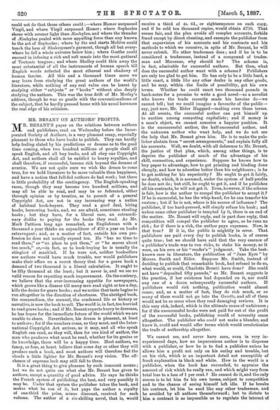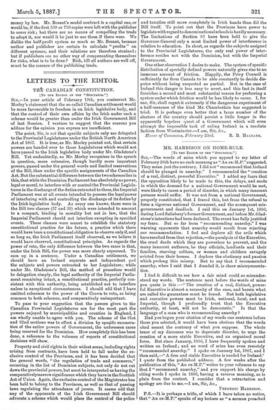MR. BESANT ON AUTHORS' PROFITS.
MR. BESANTS paper on the relations between authors and publishers, read on Wednesday before the Incor- porated Society of Authors, is a very pleasant essay, especially pleasant to those who have books to publish. They can hardly help feeling elated by his predictions or dreams as to the good time coming, when two hundred millions of people shall all speak English, and all buy books, and all obey one Copyright Act, and authors shall all be entitled to heavy royalties, and shall therefore, if successful, become rich beyond the dreams of avarice. We are not quite sure we wish the dream to come true, for we hold literature to be more valuable than happiness, and have a notion that full-fed authors do bad work ; but there is little probability of the contingency. The English-speaking races, though they may become two hundred millions, and may all be able to read, and may be so federated, either through opinion or by treaties, as to permit of a general Copyright Act, are not in any increasing way a nation of habitual book-buyers. They read a good deal, hiring books, borrowing books, and, we are afraid, sometimes stealing books ; but they have, for a liberal race, an extraordi- nary dislike to paying for the books they read. As Mr. Mark Pattison long ago remarked, an Englishman with a thousand a year thinks an expenditure of £50 a year on books extravagant ; and, as a matter of fact, outside his own pro- fession he does not usually expend ten. He "has no time to read them," or "no place to put them," or "he moves about too much," or, in fact, as to book-buying he is usually the stingiest of mankind. If he were not, neither booksellers nor authors would have much trouble, nor would publishers make their offers on a secret theory that for a grave book a demand of two thousand is a liberal calculation. It ought to be fifty thousand at the least ; but it never is, and we see no valid reason for expecting much improvement. On the contrary, we believe that the ever-increasing appetite for newspapers, which grows like a disease till many men read eight or ten a day, kills the desire for grave books ; and we notice that taste begins to run altogether in the direction of shortness. The abridged book, the compendium, the manual, the condensed life or history or narrative, is now the book to sell. The world is,in fact, too hurried to read grave books ; and if Mr. Besant expects hurry to decrease, he has hopes for the immediate future of the world which we are unable to share. Nevertheless, his dream is pleasant, at least to authors ; for if the numbers come, as they must, and the Inter- national Copyright Act arrives, as it may, and all who speak English can read, as they will, then for one kind of author, the man who produces what must be read, whether for its genius or its knowledge, there will be a happy time. Most authors, we fancy, or fear, at heart believe that some day or other they will produce such a book, and most authors will therefore feel the clouds a little lighter for Mr. Besant's rosy vision. The off. chance of supreme luck may still fall to them.
It is a great thing to give pleasure by such innocent means ; but we do not quite see what else Mr. Besant has given to authors, except a quantity of good advice. He says he thinks the French system of publishing the best, and very possibly it may be. Under that system the publisher takes the book, and makes what he can of it, but pays the author a royalty of one-third the price, minus discount, received for each volume. The author of a six-shilling novel, that is, would receive a third of 4s. 6d., or eighteenpence on each copy, and if he Bold ten thousand copies, would obtain £750. That seems fair, and the plan avoids all complex accounts, forbids fraud except by direct cheating, and exempts the publisher from that supervision of his accounts and his contracts and his methods to which we conceive, in spite of Mr. Besant, he will never submit. No other tradesman does ; and if he is to be considered a tradesman, instead of a compound of trades- man and Maecenas, why should he ? The scheme is, in fact, admirable for successful authors. But then, what does the successful author want with a scheme P Publishers are only too glad to get him. He has only to be a little hard, a little exact, a little like any other dealer in any other goods, and he may, within • the limits of possibility, get his own terms. Whether he could exact two thousand pounds in bank-notes for a promise to write a good novel—as a novelist who knows the trade recently made his heroine do—we cannot tell ; but we could imagine a favourite of the public— say, just now, Mr. Rider Haggard—making even those terms. At all events, the successful author can put himself up to auction among competing capitalists; and if money is a man's object, we cannot conceive a happier position. It is the unsuccessful author, the half-successful author, and the unknown author who want help, and we do not see the help that Mr. Besant gives him. He is to make the pub- lisher abstain from " secret arrangements," and explain fully all his accounts. Well, we doubt, with all deference to Mr. Besant, the justice of that plan, which, among other things, is to deprive the publisher of much of the advantage of his skill, connection, and experience. Suppose he knows how to bay paper to advantage, how to get printing and binding done cheaply, and how to advertise better than his neighbours ; is he to get nothing for his superiority P He ought to get it fairly, no doubt, which, it is assumed, under the system of half-profits he does not do; but still, he ought to get it, and if he publishes all his contracts, he will not get it. Even,however, if the scheme is fair, how is the author to compel the publisher to accept it ? If he is successful, he has the whip-hand, for he can transfer his custom ; but if he is not, where is his source of influence P The publisher, if too bard-pressed, will simply refuse his book ; and unless some other publisher is tempted by it, there is an end of the matter. Mr. Besant will reply, and in part does reply, that competition will compel the publisher to agree, as he runs no risk ; for if there is a risk, the author pays expenses. Now, is that true P If it is, the public is mightily in error. That publishers are paid every day to publish books, is of course quite true; but we should have said that the very essence of a publisher's trade was to ran risks, to stake his money, as it were, on his own or his " reader's " judgment. Take the best- known case in literature, the publication of "Jane Eyre " by Messrs. Smith and Elder. Suppose Mr. Smith, instead of deciding to publish that remarkable book, had refused to do so, what would, or could, Charlotte Broutd have done? She could not have "deposited fifty pounds," as Mr. Besant suggests is the practice, if her existence had depended on it, nor could any one of a dozen subsequently successful authors. If publishers would risk nothing, publication would almost cease; and, as a matter of fact, they do risk much, or so many of them would not go into the Gazette, and all of them would not be so cross when they read damaging reviews. It is this very risk, indeed, which is the ultimate cause of unfairness ; for if the unsuccessful books were not paid for out of the profit of the successful books, publishing would of necessity cease altogether. The publisher who could not make a blunder, and knew it, could and would offer terms which would revolutionise the trade of authorship altogether.
We cannot see, and never have seen, even in very in- experienced days, how an impecunious author is to dispense with a publisher, or how he is to find a publisher unless he allows him a profit not only on his outlay and trouble, but on his risk, which is an important detail not susceptible of frank explanation in black and white. How in the world is a publisher, when the book has succeeded, to appraise the amount of risk which he really ran, and which might vary from total loss to a lose of 1 per cent.? He cannot do it, and the only course is to let him fix his own terms, subject to competition and to the chance of seeing himself left idle. If he breaks his contract, let him be sued like any other tradesman, and be avoided by all authors thenceforward ; but to dictate to him a contract is as impossible as to regulate the interest of money by law. Mr. Besant's model contract is a capital one, or would be, if the first 500 or 750 copies were left with the publisher to cover risk ; but there are no means of compelling the trade to adopt it, nor would it be just to use them if there were. We dislike the half-profit system as much as Mr. Besant, because author and publisher are certain to calculate " profits " on different systems, and their relations are therefore strained ; but if publishers see no other way of compensating themselves for risks, what is to be done ? Risk, till all authors are well off, must be the essence of the publishing trade.



































 Previous page
Previous page